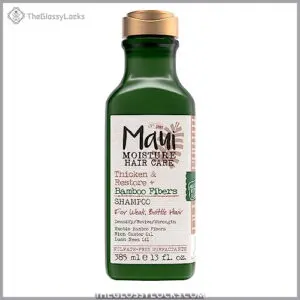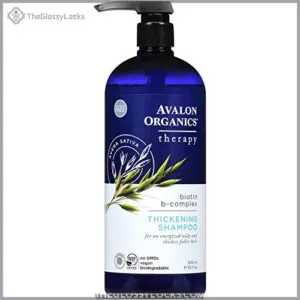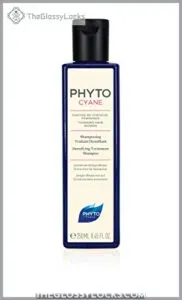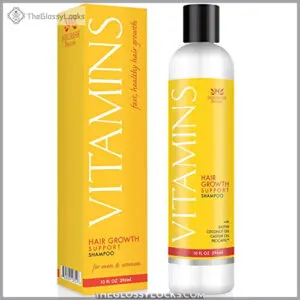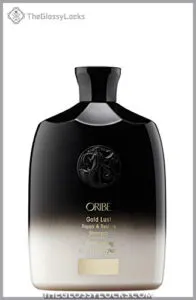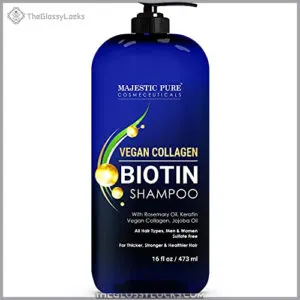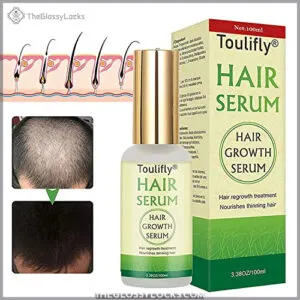This site is supported by our readers. We may earn a commission, at no cost to you, if you purchase through links.
You probably didn’t expect those thick, gorgeous pregnancy locks to start falling out in clumps three months after delivery. Yet here you are, watching what feels like entire handfuls disappear down the shower drain.
This postpartum hair shedding, triggered by plummeting estrogen levels, affects up to 50% of new mothers and can last anywhere from three to six months.
The good news? The right postpartum shampoo—packed with biotin, keratin, and scalp-nourishing ingredients—can help minimize the shedding, strengthen what’s left, and support healthier regrowth during this frustrating phase.
Not all shampoos are created equal when your hormones are in flux and your scalp needs extra care.
Table Of Contents
- Key Takeaways
- What Causes Postpartum Hair Loss
- Key Ingredients in Postpartum Shampoos
- How to Choose The Best Postpartum Shampoo
- Top 8 Best Postpartum Shampoos Reviewed
- 1. Maui Moisture Bamboo Fibers Shampoo
- 2. Avalon Organics Biotin B Complex Shampoo
- 3. PHYTO Phytocyane Thin Hair Shampoo
- 4. Nourish Beaute Hair Loss Shampoo
- 5. Oribe Gold Lust Restorative Shampoo
- 6. Ultrax Labs Hair Surge Shampoo
- 7. Majestic Pure Biotin Hair Shampoo
- 8. Hair Growth Serum Treatment for Adults
- Supporting Hair Regrowth After Pregnancy
- When to Expect Results From Shampoos
- Safe Hair Care Practices Postpartum
- Frequently Asked Questions (FAQs)
- Are there any natural ingredients that can help with postpartum hair loss?
- How can I maintain healthy hair after giving birth?
- Are there any shampoos specifically designed for postpartum hair loss?
- Are there any side effects associated with postpartum shampoos?
- Can breastfeeding make postpartum hair loss worse?
- Are postpartum shampoos safe during pregnancy?
- How often should I wash my hair postpartum?
- Do expensive shampoos work better than drugstore options?
- Will my hair texture change permanently after childbirth?
- Conclusion
Key Takeaways
- Postpartum hair loss affects up to 50% of new mothers, typically peaking around 3-6 months after delivery due to plummeting estrogen levels that push hair follicles into a synchronized shedding phase called telogen effluvium.
- The most effective postpartum shampoos contain biotin for strengthening follicles, keratin and collagen for repairing damaged strands, tea tree oil for scalp health, and sulfate-free formulas that won’t strip your already-stressed hair of natural oils.
- Clinical studies show that targeted ingredients like caffeine, saw palmetto, and DHT blockers can reduce shedding by up to 47% and increase hair growth by over 120% when used consistently for 8-12 weeks.
- Hair regrowth takes patience—most women see their hair cycle normalize by 10-12 months postpartum, with full regrowth complete by 18 months, especially when combining the right shampoo with proper nutrition, gentle handling, and stress management.
What Causes Postpartum Hair Loss
If you’re watching clumps of hair gather in your shower drain, you’re not imagining things. Postpartum hair loss affects nearly half of all new mothers, and it’s rooted in real biological changes happening in your body.
Understanding what’s behind this shedding can help you address it more effectively and know what to expect as your body recovers.
Hormonal Changes After Childbirth
When your body shifts gears after delivery, estrogen levels plummet, and that hormonal drop triggers widespread hair shedding. Here’s what’s happening behind the scenes:
- Estrogen Level Drop: Your hormones nosedive postpartum, pushing hair follicles into the shedding phase all at once.
- Postpartum Timeline: Most women notice increased shedding around 2-3 months, peaking at 5 months after birth.
- Breastfeeding Impact: Extended nursing can prolong hair loss by keeping estrogen suppressed longer. This shedding phase is also known as telogen effluvium.
Disruption of The Hair Growth Cycle
That drop in estrogen flips a switch on your hair growth cycle, forcing a huge percentage of follicles into the resting phase—what we call telogen effluvium. Normally, only about 10% of your hair rests at once, but postpartum that number jumps to 30%.
This shedding synchronization means hundreds of hairs can fall daily instead of the usual fifty to one hundred. Good protein intake can also help support hair health.
Nutritional Deficiencies and Stress
Your nutrition takes a hit when you’re running on fumes and surviving on leftovers. Studies show that 87% of women dealing with postpartum hair loss have low vitamin D levels, and nearly half have iron deficiency.
Studies show 87% of women with postpartum hair loss have low vitamin D, and nearly half are iron deficient
Stress management becomes impossible when sleep deprivation is your reality, and high cortisol levels worsen the shedding.
These nutritional changes and vitamin and mineral deficiencies create the perfect storm for thinning hair.
Impact of Thyroid Function Postpartum
Thyroid function can take a hit postpartum, and it’s one of those sneaky causes of hair loss that often gets missed. Postpartum thyroiditis can swing you into hypothyroidism, causing diffuse thinning—one study found 150 out of 500 women with hair loss had it.
TSH blood tests reveal the truth, and thankfully, most cases resolve when thyroid function balances out.
Key Ingredients in Postpartum Shampoos
When you’re choosing a postpartum shampoo, the ingredient list matters more than the brand name on the bottle. Certain ingredients have proven track records for supporting hair regrowth and minimizing shedding during this recovery period.
Here’s what to look for when you’re scanning those labels.
Biotin for Strengthening Hair
You’ve probably heard biotin touted as a hair growth miracle, and there’s actually some science behind it. Up to 38% of women with postpartum hair loss show biotin deficiency in observational studies.
Clinical evidence suggests that biotin supplementation can strengthen follicles and promote regrowth, especially if you’re deficient. That’s why biotin appears in most best postpartum shampoo formulations, though supplement efficacy remains strongest when you have a measured deficiency.
Keratin and Collagen for Repair
Your hair is literally built from keratin, so it makes sense that shampoos containing hydrolyzed keratin can restore elasticity and reduce hair breakage—lab tests show up to 18% improvement in tensile strength. Collagen-enriched formulas work similarly, especially when paired with Vitamin C to support collagen synthesis.
Here’s what protein shampoo benefits look like for postnatal hair resilience:
- Reinforced strand structure from vegan keratin protein
- Reduced breakage during brushing and styling
- Improved texture as new growth comes in
One randomized trial found 72% of postpartum participants saw better hair repair with regular protein-based formulas.
Tea Tree Oil for Scalp Health
Tea tree special shampoo ingredients offer potent antifungal properties that reduce dandruff by targeting Malassezia species, while its anti-inflammatory ingredient cuts scalp irritation by 43%. These postpartum benefits support scalp health and hair growth together—critical when you’re already dealing with shedding.
Safe usage means properly diluted formulas that won’t overdry your sensitive postpartum scalp.
| Benefit | Clinical Result |
|---|---|
| Scalp itching relief | 43% reduction |
| Reduced greasiness | 23% improvement |
| Dandruff control | Significant decrease |
| Scalp inflammation | Notable improvement |
Sulfate-free and Paraben-free Formulas
Your postpartum scalp doesn’t need aggressive sulfates stripping natural oils—gentle cleansing preserves what you’ve got left. Sulfate-free shampoos for hair loss dominate over 40% of the market, reaching $5.13 billion in 2024, because they reduce scalp irritation without compromise.
Skipping parabens matters too, since these preservatives raise hormone disruption concerns. The best shampoos for postpartum hair loss prioritize safer ingredients your body actually needs right now.
How to Choose The Best Postpartum Shampoo
Choosing the right postpartum shampoo isn’t about grabbing the first bottle that promises thicker hair—it’s about understanding what your hair actually needs right now. Your scalp and strands are recovering from months of hormonal shifts, so you’ll want to match your shampoo to your specific hair type, sensitivities, and whether you’re dealing with color-treated hair.
Let’s walk through the key factors that’ll help you find a shampoo that works with your body, not against it.
Factors for Different Hair Types
Your hair type plays a major role in choosing the right postpartum shampoo. Consider these key factors:
- Curly hair needs and Afro hair require sulfate-free formulas with amino acids to restore elasticity and reduce breakage by up to 46%.
- Oily scalp control benefits from clarifying shampoos that reduce sebum by 53%.
- Fine hair volume improves 22% with rice protein and biotin.
- Wavy hair hydration demands glycerin-based formulas to cut frizz by 44%.
Ingredients to Avoid for Sensitive Scalps
When your scalp feels like it’s staging a protest, certain ingredients are usually the culprits. Sulfates trigger irritation in 12–15% of sensitive individuals postpartum, while parabens disrupt hormones and cause reactions in 8–10% of users.
Fragrance allergens top the list, present in 97% of shampoos. Skip formaldehyde-releasers like DMDM hydantoin, alcohol-heavy formulas, and silicones—your recovering scalp deserves gentler treatment.
Volumizing and Thickening Properties
Beyond soothing sensitive skin, you’ll want formulas that actually restore fullness. Biotin-infused volumizing shampoos can boost hair fiber diameter by 12% within two weeks, delivering that immediate volume boost you’re craving.
Look for active thickening ingredients like caffeine, copper peptides, or Baicapil—clinical studies show these increase hair density by 21–59%. Most users notice improved thickness within four weeks, with 85% reporting visible root lift and better manageability throughout their postpartum journey.
Safety for Color-treated Hair
If you color your hair, pH-balanced sulfate-free formulas protect your investment. Acidic shampoos reduce color bleeding by 46% compared to harsh alternatives.
UV protection ingredients block up to 85% of damaging rays that fade dye, while avoiding ammonia and parabens cuts irritation by 31%.
Color-treated hair washed with clinically proven safe shampoos retains vibrancy for 7.5 weeks, delaying touch-ups considerably.
Top 8 Best Postpartum Shampoos Reviewed
You’ve learned what to look for in a postpartum shampoo, so now it’s time to see which products actually deliver.
The shampoos below were selected based on their ingredient quality, consumer reviews, and ability to address the specific hair changes you’re experiencing.
Each option offers something different, whether you’re dealing with thinning at the hairline, need volume, or want to support overall scalp health.
1. Maui Moisture Bamboo Fibers Shampoo
When you’re watching clumps of hair swirl down the drain, you need a shampoo that delivers. Maui Moisture’s Bamboo Fibers formula leads with 100% aloe vera and combines coconut water hydration with castor oil strength to tackle postpartum hair loss head-on.
This sulfate-free formula works well for curly hair types, helping densify brittle strands without weighing them down.
As vegan haircare goes, it’s reasonably priced at $7.47 for 13 ounces, though its thick consistency can make dispensing tricky for some users.
Best For: Women dealing with postpartum hair loss or thinning curls who want a gentle, plant-based shampoo that strengthens without harsh chemicals.
- Leads with 100% aloe vera and packs in bamboo fibers, castor oil, and neem oil to actually strengthen brittle strands instead of just coating them.
- Sulfate-free and vegan formula keeps your scalp happy while working well on curly, color-treated, or transitioning hair.
- At $7.47 for 13 ounces, you’re getting solid ingredients without the luxury price tag.
- The thick consistency makes it hard to squeeze out of the bottle, which gets annoying when you’re in the shower.
- Some people find the lemon and cedarwood scent too strong or just not their thing.
- Results vary—while many see less breakage and more volume, not everyone notices the thickening effect they’re hoping for.
2. Avalon Organics Biotin B Complex Shampoo
If you’re looking for clean ingredients without compromise, Avalon Organics Biotin B Complex Shampoo delivers. This vegan formula combines biotin benefits with saw palmetto and quinoa protein at $17.69 for 14 ounces—EWG Verified and cruelty-free.
User reviews consistently mention softer, thicker hair within two to four weeks, though some found it drying without conditioner. The scalp energizing blend includes vitamin E and botanical oils, making ingredient safety straightforward for nursing mothers. It’s pH balanced to support hair growth while being gentle enough for color-treated hair.
Best For: People with fine or thinning hair who want a clean, vegan shampoo that supports scalp health and thicker-looking hair without harsh chemicals.
- EWG Verified and cruelty-free formula with biotin, saw palmetto, and quinoa protein that’s free of parabens, sulfates, and synthetic fragrances.
- Users report noticeably softer and thicker hair within 2-4 weeks of regular use.
- PH balanced and gentle enough for color-treated hair while supporting an energized scalp.
- Some users find it drying and need to pair it with conditioner to avoid stripped hair.
- Results vary significantly between individuals, with some reporting minimal change in hair shedding.
- The natural fragrance and essential oils may cause sensitivity in people with highly reactive scalps.
3. PHYTO Phytocyane Thin Hair Shampoo
PHYTO Phytocyane Shampoo brings clinical efficacy to your postpartum hair loss routine with patented ingredients like tulip extract, hydrolyzed soy protein, and ginkgo biloba. In trials with 76 women, 85% saw reduced shedding within two months—impressive numbers for temporary hair loss.
The usage protocol calls for consistent application to a towel-dried scalp, with no rinsing required. Users report visible thickness after two to three months.
Its safety profile stands out: 96% natural-origin ingredients, no silicones or dyes, making it gentle for nursing mothers with sensitive scalps.
Best For: Women dealing with temporary hair thinning from postpartum shedding, stress, or hormonal changes who want a clinically-tested, natural formula that’s gentle on sensitive scalps.
- Clinical results show 85% of users experienced reduced hair loss within two months, with noticeable volume improvements in the first month.
- Formula is 96% natural-origin ingredients without silicones, parabens, or dyes, making it safe for nursing mothers and those with scalp sensitivity.
- Contains patented ingredients like tulip extract and ginkgo biloba specifically targeted at strengthening hair and addressing temporary thinning.
- Product has been discontinued, so availability may be limited or inconsistent.
- Requires a strict three-month protocol with frequent applications to see sustained results, which demands commitment.
- Can leave hair feeling dry without a follow-up conditioner, and the thin consistency may feel less luxurious than expected.
4. Nourish Beaute Hair Loss Shampoo
Nourish Beaute Hair Loss Shampoo delivers serious science with its triple-threat formula: Procapil, Baicapil, and Redensyl—patented DHT blockers backed by clinical studies showing a 121% increase in hair growth and 47% decrease in shedding.
You’ll find biotin, keratin, and nourishing castor and coconut oils working together to strengthen follicles disrupted by postpartum hormone shifts. User reviews consistently praise visible improvements within 8 to 12 weeks.
The sulfate-free, paraben-free formula meets strict safety standards, making it appropriate for nursing mothers. At $18.13, it’s an accessible option with a 90-day money-back guarantee.
Best For: New moms dealing with postpartum hair loss who want a clinically-backed, sulfate-free shampoo that tackles hormonal shedding without harsh chemicals.
- Powered by three patented DHT blockers (Procapil, Baicapil, Redensyl) with clinical studies showing 121% more hair growth and 47% less shedding in just weeks.
- Sulfate-free, paraben-free, and cruelty-free formula that’s safe for nursing mothers and sensitive scalps, made in the USA under strict FDA-compliant standards.
- Affordable at $18.13 with a 90-day money-back guarantee, so you can test it risk-free through a full hair growth cycle.
- Results take patience—most users don’t see noticeable changes until 8 to 12 weeks of consistent use, which means sticking with it through multiple bottles.
- Not a miracle worker for everyone; some reviews mention minimal improvement, especially if hair loss stems from causes beyond hormones or DHT.
- The coconut scent and liquid consistency might not appeal to everyone, and at less than a pound per bottle, you’ll need to reorder frequently if using it several times a week.
5. Oribe Gold Lust Restorative Shampoo
Oribe Gold Lust Repair & Restore Shampoo targets damaged postpartum hair with a Bio-Restorative Complex—plant collagen, caffeine, biacin, and niacinamide—that strengthens from root to strand. Consumer surveys show 91% of users noticed hair improvement within seven days, though these findings lack independent clinical trials.
The sulfate-free, paraben-free safety profile works well for color-treated hair and sensitive scalps. You’ll apply it to wet hair, massaging thoroughly before rinsing.
At $53 for 8.5 ounces, it’s pricey but delivers noticeable moisture and resilience when paired with matching conditioner.
Best For: Anyone dealing with damaged, brittle postpartum hair who wants a clean-ingredient shampoo that strengthens from the roots and restores moisture without harsh sulfates.
- Bio-Restorative Complex with plant collagen and caffeine penetrates deep to rebuild hair strength from within, with 91% of users seeing improvement in just seven days.
- Sulfate-free and paraben-free formula is safe for color-treated and keratin-treated hair, making it ideal for postpartum sensitivity.
- Argan oil and amino acids deliver serious moisture and shine while sealing damaged ends, so hair feels softer and more resilient.
- At $53 for 8.5 ounces, it’s expensive compared to drugstore options, which might not fit every postpartum budget.
- The small bottle size means you’ll run through it quickly if you have long or thick hair.
- Results are based on short-term consumer surveys rather than independent clinical trials, so long-term effectiveness isn’t fully proven.
6. Ultrax Labs Hair Surge Shampoo
Ultrax Labs Hair Stimulating Shampoo relies on caffeine efficacy and saw palmetto to block DHT—the hormone behind postpartum hair loss—while boosting blood flow to follicles. User satisfaction is high, with many reporting 80–90% less shedding and visible regrowth within 14 to 30 days.
Application insights matter: massage it into your scalp for at least two minutes daily. The formulation safety includes sulfate (SLES), so patch-test if you’re sensitive.
At $69.99, it’s premium-priced but effective for stimulating hair growth without harsh chemicals.
Best For: People dealing with postpartum hair loss or thinning hair who want a caffeine-based solution that blocks DHT without resorting to harsh chemical treatments.
- Uses caffeine and saw palmetto to block DHT and stimulate follicles, with many users reporting 80-90% less shedding within 14-30 days.
- Works for all hair types and is gentler than chemical treatments, with clinical evidence backing its effectiveness comparable to 5% minoxidil.
- Long-lasting formula that’s cruelty-free and made with mostly natural ingredients, making it cost-effective despite the premium price.
- At $69.99, it’s expensive compared to drugstore shampoos, which might be a barrier for some buyers.
- Contains sulfates (SLES) that can irritate sensitive scalps or leave hair feeling dry without a conditioner.
- Results vary widely—some users see no improvement, and it requires daily use for 1-3 months to see any effects.
7. Majestic Pure Biotin Hair Shampoo
Majestic Pure Biotin Shampoo combines biotin, rosemary oil, and castor oil in a sulfate-free formula designed to strengthen thinning postpartum hair. Biotin shampoo benefits include fortifying hair shafts, while argan oil and DHT blockers target the hormonal roots of hair loss.
User experiences vary—about 54% gave five stars, reporting thicker hair after consistent use, though some noticed initial shedding. At 4.2 stars and around $25, it’s gentler on your scalp than harsher shampoos.
For best results, massage into your scalp daily and pair with the matching conditioner.
Best For: People dealing with postpartum hair loss or thinning who want a gentle, sulfate-free shampoo with natural oils and biotin to strengthen hair over time.
- Sulfate-free formula with biotin, rosemary oil, and argan oil that’s gentle enough for daily use on sensitive or thinning hair.
- Over half of users report thicker, healthier hair with consistent use, earning it a solid 4.2-star rating.
- Includes DHT blockers and nourishing ingredients like vitamin E that target hormonal hair loss while reducing frizz.
- Some users dislike the medicinal or perfumed scent, which can be off-putting during daily washes.
- Results take time—you might need to use it for over a month to see noticeable changes, and some people experience initial shedding.
- Pricier than drugstore options at around $25, and occasional packaging issues like leaks have been reported.
8. Hair Growth Serum Treatment for Adults
Hair growth serums—often paired with your shampoo routine—deliver concentrated actives like minoxidil, biotin, and caffeine directly to your scalp to stimulate follicles and reduce postpartum shedding.
Clinical studies show daily serum application can improve hair density by over 10% after three to six months, making them a proven hair loss treatment.
Apply 2–3 mL nightly, massaging gently to boost absorption. While no miracle overnight fix, consistent use aids hair regrowth by extending the growth phase and anchoring strands longer during your postpartum recovery.
Best For: Adults experiencing postpartum hair loss or thinning who want a clinically-backed, daily treatment that delivers active ingredients like minoxidil and biotin directly to the scalp.
- Clinical studies show over 10% improvement in hair density after three to six months of consistent daily use, with some trials reporting significant results in as little as 8–12 weeks.
- Targeted delivery of concentrated actives like minoxidil, biotin, and caffeine stimulates follicles, reduces shedding, and extends the hair growth phase more effectively than shampoo alone.
- Unscented formula works well for adults with fine, relaxed, or color-treated hair, and some formulations are nursing-friendly for postpartum users.
- Results require patience—most users need at least three months of nightly application before seeing noticeable improvements, with no overnight miracle fix.
- Some products have packaging issues like leakage or tampering, and limited ingredient transparency may leave questions about potential side effects.
- Individual results vary, and continued use is often necessary to maintain benefits, which can add up in cost and commitment over time.
Supporting Hair Regrowth After Pregnancy
While the right shampoo can support healthier hair, regrowth doesn’t happen in isolation. Your body needs consistent nutritional support, gentle handling, and realistic expectations about timing.
The strategies below work alongside postpartum shampoos to create conditions where your hair can recover naturally.
Nutrition and Vitamin Supplementation
Beyond shampoo, what you put in your body matters just as much as what you put on your hair. Postpartum hair loss often worsens with nutrient deficiencies, particularly iron, vitamin D, and biotin.
A balanced intake through your postpartum diet or targeted supplementation strengthens hair follicles from within. Studies show supplement efficacy peaks around 90 to 180 days, so consistency counts.
Gentle Hair Care Routines
While nutrition sets the foundation, how you handle your hair day-to-day makes a real difference in managing postpartum hair loss. Start with gentle detangling using wide-tooth combs on damp hair, working from ends to roots. Air drying beats heat tools every time.
Try silk pillowcases to reduce friction overnight, and incorporate scalp massage during shampooing to boost circulation and support hair care without added stress.
Avoiding Heat Styling and Harsh Chemicals
Beyond gentle handling, what you put on your hair matters just as much. Heat styling damage starts around 130°C, causing protein breakdown and cuticle cracks that worsen postpartum shedding.
Chemical sensitivity postpartum runs high too—formaldehyde and sulfates in regular products trigger scalp irritation when your hormones are already unstable.
Sulfate-free benefits include less inflammation and faster recovery, so check ingredients to avoid anything harsh while your scalp heals.
Managing Stress and Sleep
Sleep deprivation and elevated cortisol levels from managing stress postpartum directly worsen hormonal changes that trigger hair loss. Research shows sleep interventions—like napping when baby sleeps and structured routines—improve maternal well-being and reduce inflammation markers that accelerate shedding.
Better rest aids hair health by stabilizing hormones and improving infant outcomes, making sleep management as important as any shampoo you’ll use.
When to Expect Results From Shampoos
You won’t see a full head of hair overnight—postpartum shampoos work gradually as part of your overall recovery. Most women notice subtle changes within weeks, but real regrowth takes time and patience.
Here’s what to expect as your hair begins to bounce back.
Typical Hair Regrowth Timeline
You’ll likely notice postpartum hair loss starting around two to four months after delivery, with shedding peaking between months three and six. This telogen effluvium phase is temporary—your hair cycle gradually normalizes by 10 to 12 months, with most regrowth complete by 18 months.
Individual variation matters, though: factors like age, breastfeeding, and thyroid function affect your timeline.
Early Signs of Improvement
Most often, you’ll spot early signs of recovery before full hair regrowth occurs. Around three to six months postpartum, look for these indicators that your hair loss prevention efforts are working:
- Reduced Hair Shedding: Daily loss drops from 200-300 hairs to closer to 100, signaling hormonal stabilization
- New Hair Growth: Delicate baby hairs emerge along your hairline and temples
- Strand Strength: You’ll notice less breakage and improved elasticity when brushing
Factors That Affect Results
Your results depend on several intersecting factors. Hormone balance after childbirth, genetic factors, and age influence how quickly you’ll see improvement from postpartum shampoos.
Nutrient deficiency and stress levels can slow hair growth, while ideal scalp health accelerates it.
Women with underlying hormonal changes and hair loss may need 12-18 months of consistent care before noticing significant regrowth.
Safe Hair Care Practices Postpartum
Your hair is already going through a lot postpartum, so the way you handle it day-to-day really matters. Small adjustments to your routine can make a big difference in preventing unnecessary breakage and keeping your scalp healthy.
Here’s what you need to focus on to protect your hair during this recovery period.
Tips for Minimizing Hair Breakage
Your hair breakage prevention routine starts with gentle hair care practices that protect vulnerable strands. When washing, massage shampoo into your scalp without harsh rubbing, and let water flow through your hair during rinsing.
Air drying beats blow-drying since high heat weakens keratin proteins, making postpartum hair loss worse.
Brush from ends upward using soft bristles to reduce split ends and mechanical stress on thinning hair.
Recommendations for Scalp Care
Think of your scalp as soil where new growth begins—nurture it properly, and you’ll see better hair growth results. Here’s how to support scalp health during postpartum hair loss:
- Massage with natural oils like coconut or argan oil weekly to boost blood circulation to hair follicles
- Cleanse gently 1-2 times weekly using sulfate-free shampoos at lukewarm temperatures
- Consult dermatologists if itchiness or shedding persists beyond 15 months postpartum
Considerations for Hair Coloring Postpartum
Before you reach for that box of dye, understand that postpartum hair loss changes your hair’s texture and porosity—making color absorption unpredictable. Your hair may grab dye unevenly or fade faster than expected.
If you’re considering hair coloring postpartum, wait until three months after delivery, choose ammonia-free dye formulations designed for color-treated hair, and always patch-test first to avoid scalp irritation.
Consulting a Professional if Hair Loss Persists
Most postpartum hair loss resolves by twelve months, but if you’re still shedding heavily beyond that mark—or noticing bald patches, scalp inflammation, or symptoms like fatigue and weight changes—it’s time for a medical evaluation.
A dermatologist can perform scalp analysis, blood tests, and a proper hair loss diagnosis to identify hormonal changes and hair loss causes, then recommend customized hair loss treatment options individualized to your situation.
Frequently Asked Questions (FAQs)
Are there any natural ingredients that can help with postpartum hair loss?
Yes, several natural ingredients support hair regrowth. Saw palmetto blocks DHT, rosemary oil improves circulation like minoxidil, while biotin and pumpkin seed oil strengthen follicles and boost keratin production effectively.
How can I maintain healthy hair after giving birth?
You’ll want to focus on gentle shampooing with sulfate-free products, nourishing your body with iron and vitamin D, avoiding excessive heat styling, and getting regular scalp massages to boost circulation and support healthy hair habits.
Are there any shampoos specifically designed for postpartum hair loss?
Like finding an oasis in the desert, specialized postpartum shampoos offer targeted relief.
Products from Nioxin, PURA D’OR, and Vegamour feature biotin, keratin, and gentle formulas specifically designed to combat postpartum hair loss and encourage regrowth.
Are there any side effects associated with postpartum shampoos?
Most postpartum shampoos won’t cause major side effects, but some ingredients like sulfates or fragrances can trigger scalp irritation or allergic reactions.
If you notice redness, itching, or increased hair shedding, switch products immediately.
Can breastfeeding make postpartum hair loss worse?
Breastfeeding doesn’t directly worsen postpartum hair loss, but it can extend the timeline. Sustained lower estrogen levels during lactation may prolong shedding, while increased nutritional demands affect hair regrowth if your diet lacks essential nutrients.
Are postpartum shampoos safe during pregnancy?
Most postpartum shampoos with sulfate-free, paraben-free formulas are safe during pregnancy.
However, you’ll want to avoid products containing phthalates, synthetic fragrances, or formaldehyde, as these chemical exposures pose potential fetal risk.
How often should I wash my hair postpartum?
You’ll want to wash your hair 1-3 times weekly during postpartum hair loss, adjusting based on your scalp condition and hair type.
Gentle, sulfate-free shampoos protect fragile strands while maintaining healthy scalp hygiene.
Do expensive shampoos work better than drugstore options?
Many prestige shampoos contain three times more active ingredients than drugstore alternatives, but recent modernization has narrowed the gap—blind tests show only 12% difference in hydration ratings, making the best drugstore shampoos viable.
Will my hair texture change permanently after childbirth?
For most women, hair texture changes are temporary and resolve within 12-18 months as hormones stabilize.
However, about 10-20% may notice lasting shifts in curl pattern, thickness, or manageability due to hormonal changes during pregnancy.
Conclusion
It’s no coincidence that the very moment you’re adjusting to new motherhood, your hair decides to stage its own rebellion. Your body brought life into the world; it deserves nourishment and patience as it recalibrates.
But armed with the best postpartum shampoo suited to your needs—whether it’s biotin-rich formulas or gentle, sulfate-free cleansers—you’re not helpless in this process. Give it time, choose wisely, and trust that regrowth is already underway.
- https://www.vogue.com/article/postpartum-hair-loss-solutions-harklinikken
- https://www.forhers.com/news/shock-of-postpartum-hairloss
- https://newmodernmom.com/blog/best-shampoo-for-postpartum-hair-loss-top-picks/
- https://babyblues.care/blogs/news/the-5-best-shampoos-for-postpartum-hair-loss
- https://www.healthline.com/health/parenting/best-postpartum-hair-products







